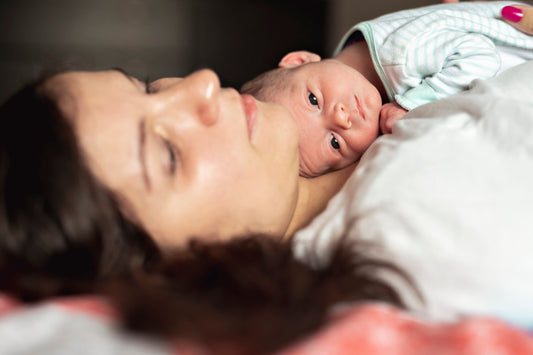What To Do if Your Baby Will Only Sleep in Your Arms
| updated:Share

After 9+ months of carrying your bundle of joy in your womb, there is nothing more rewarding than cradling them in your arms and watching their precious little face and eyes as they drift in and out of sleep.
As cute as it is initially, your little one may become too accustomed to being held. Some parents find that their baby finds it difficult to sleep anywhere else. What do you do if your little one refuses to sleep anywhere but in your arms? Is it a bad thing?
Why Your Baby Will Only Sleep When Held
In the early stages of development outside of the womb, it is natural for your baby to feel most comfortable in your arms. As your little one adjusts to life outside the womb, they feel most safe and secure when held by mommy or daddy. The behavior should begin to change as they age, but there are some reasons a little one may refuse to adapt to a different sleeping cycle or environment.
Babies prefer being held primarily because they spent nine+ months in the womb. They likely long for the close quarters and ambient sounds of their previous room, so they are reluctant to give up on being held to fall asleep.
Supported sleep can also become habitual. Sleeping is a skill, and your little one needs to learn it whether you realize it or not. Parents may also hinder sleep cycles by not knowing ideal wake windows, or they may not recognize the signs of colic or reflux.

Is it Bad That a Baby Sleeps in Your Arms?
There is nothing wrong with allowing your newborn to sleep in your arms. Many parents enjoy holding their babies while they sleep. Some parents will actively try to stretch this infancy period because they enjoy it, which is acceptable.
However, remember that the longer you insist on holding your baby while they sleep, the more challenging it will be to break the habit. Eventually, you and your little one will need better quality sleep, requiring independent sleeping arrangements.
How To Start the Gradual Transition
Usually, babies are ready to start exploring independent sleep around the four to eight-week mark. Know the process will take time. Your little one is comfortable in your arms, and just like anyone, they resist change.
Start with gradual changes. For example, try laying your little one down for a nap once per day by themselves. Wait until they are tired to lay them in a crib or bassinet. Eventually, they associate the area with sleep, allowing for an easy transition.

Adjust Your Sleep Time Events
What is your existing sleep time practice? Do you read the little ones a book, feed them, and finally cradle them to lull them to sleep? Try switching things around. For example, feed the baby, sit them up, and read them a story. Once they are drowsy, lay them in their crib. Sometimes, playing with the order of a routine can catch your little one off guard and make it easier for them to transition into sleeping alone.
Looking Into Sleep Training
Sleep training can help you transition your baby from only sleeping when held to sleeping independently. While training will help, it takes time. You mustn't be too hard on yourself. You can find tools to help comfort your little one during the transition, such as Wellements Organic Sleepy Time Spray, a lavender-infused spray that can help calm before bed in little ones six months or older.
4.9 /
5.0
(8)
8
total reviews
Sleepy Time Spray
Sale price
$12.99
Many newborns and infants favor sleeping in their parent's arms over alone. While the hope of a transition may seem hopeless, it will happen. In the meantime, take the small victories and enjoy holding your baby close.
Sources:
https://www.thebump.com/a/baby-will-only-sleep-in-my-arms



